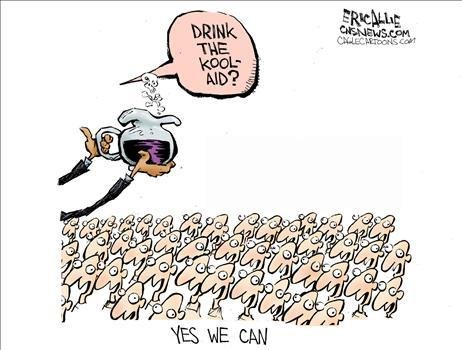
Obama and Me
Dallas Observer News
By Todd SpivaK
It was the year 2000, and I was a young, hungry reporter in Chicago with a young, hungry state legislator on my speed dial.
It’s not quite eight in the morning, and Barack Obama is on the phone screaming at me. He liked the story I wrote about him a couple weeks ago, but not this garbage.
Months earlier, a reporter friend told me she overheard Obama call me an asshole at a political fund-raiser. Now here he is blasting me from hundreds of miles away for a story that just went online but hasn’t yet hit local newsstands.
It’s the first time I’ve ever heard him yell, and I’m trembling as I set down the phone. I sit frozen at my desk for several minutes, stunned.
This is before Obama Girl, before the Secret Service detail, before he becomes a best-selling author. His book, Dreams From My Father, has been out of print for years.
I often see Obama smoking cigarettes on brisk Chicago mornings in front of his condominium high-rise along Lake Michigan, or getting his hair buzzed at the corner barbershop on 53rd and Harper in his Hyde Park neighborhood.
This is before he becomes a U.S. senator, before Oprah starts stumping for him, before he positions himself to become the country’s first black president.
He is just a rank-and-file state senator in Illinois, and I work for a string of small, scrappy newspapers there.
The other day, while stuck in traffic on Houston’s Southwest Freeway, I was flipping through right-wing rants on AM radio. Dennis Praeger was railing against Michelle Obama for her clumsy comment on being proud of her country for the first time.
Praeger went on to call her husband a blank slate. There’s no record to look at, he complained, unless you lived in Barack Obama’s old state Senate district.
Well, I lived and worked in that district for three years—nearly half Obama’s tenure in the Illinois Legislature. D-13, the district was called, and it spanned a large swath of Chicago’s poor, black, crime-ridden South Side.
It was 2000, and I was a young reporter at the Hyde Park Herald and Lakefront Outlook community newspapers earning $19,000 a year covering politics and crime.
I talked with Obama on a regular basis—a couple times a month, at least. I’d ask him about his campaign finance reports, legislation he was sponsoring and various local issues. He wrote an occasional column published in our papers. It ran with a headshot that made him look about 14 years old.
Spinning through my old Rolodex, I see that I had two cell phone numbers for Obama. Both have since been disconnected.
I also had cell phone numbers for Jesse Jackson; his son, Congressman Jesse Jackson Jr.; and David Axelrod, who now serves as Obama’s senior presidential campaign advisor.
Axelrod, too, had begun his journalism career at the Hyde Park Herald before joining the Chicago Tribune as a political reporter, then starting a political consulting firm. Another Hyde Park Herald alum was Seymour Hersh, the legendary investigative reporter who uncovered the My Lai massacre for the St. Louis Post-Dispatch and the Abu Ghraib prisoner-abuse scandal for The New Yorker.
My view of Obama then wasn’t all that different from the image he projects now. He was smart, confident, charismatic and liberal. One thing I can say is, I never heard him launch into the preacher-man voice he now employs during speeches. He sounded vanilla, and activists in his mostly black district often chided him for it.
I was 25 and had no problem interviewing big-wig politicians, but I always had to steel my nerves when calling Obama. His intelligence was intimidating, and my hands inevitably shook and sweated.
It was serendipity that I ever came to know Obama at all. Looking back, I think of it as a Forrest Gump moment: History was unfolding, and I was at the center of it, clueless. It’s a huge bummer to me that I never taped our interviews.
I moved to Chicago from the East Coast after a bad breakup. I had just one year of newspaper experience, working the courts beat for a small Vermont daily.
I picked Chicago because I had friends there. Plus, it was one of the few American cities left with two competing dailies, upping my chances of landing a gig.
I arrived determined to work for one of the big papers. I once spent an entire day dressed up in my only suit and tie—the one I wore to my brother’s wedding, where I ripped a hole in the knee while dancing with my niece—and stood, résumé in hand, outside the newsroom at the dumpy old Chicago Sun-Times building.
Columnist Neil Steinberg was gracious enough to accept my folder and even gave me his home number to call later that night. Unimpressed by my clips, Steinberg said most new recruits graduated from top journalism schools such as Northwestern or Columbia—or their mommies or daddies worked at the paper or knew somebody who did.
His advice: To work in Chicago, you have to leave Chicago. Go prove yourself someplace else, kid.
I had a friend at one of the local journalism schools who let me tag along for a school-sponsored tour of the Chicago Tribune building. After the tour, page-two columnist John Kass told us about how he got picked up by the Tribune while in his early 20s after breaking a big story at a little South Side paper.
I spent three months sleeping on a friend’s floor on the city’s South Side. He was a broke grad student who had earned a mostly free ride at the University of Chicago, working toward a Ph.D. in comparative literature. His studio apartment in Hyde Park was tiny.
We joked that the only way I could stretch my legs at night was to open the oven in the kitchen. It was like the old blues lyric, “I got a gal she’s long and tall, sleeps in the kitchen with her feet in the hall.”
Obama, who then earned about $50,000 a year as a rookie state senator, lived in a small condo just two blocks away. I had never met or even seen his wife, Michelle, though I’d heard she was employed at University of Chicago Hospitals. Their second daughter, Natasha, had not yet been born.
Every day, I walked past the Hyde Park Herald office, set upstairs from Obama’s barbershop. The newspaper box out front said all I needed to know. It was dented, covered in graffiti and broken. The thing ate your two quarters and offered nothing in return.
I didn’t want to work there. My aspirations were bigger than that.
Desperate, I finally swallowed my pride, climbed the steep, smelly staircase and submitted my shamefully thin résumé to the receptionist. To my dismay, the editor called later that afternoon with a job offer.
Chris Matthews, the MSNBC political pundit, recently grilled Texas state Senator Kirk Watson for supporting Obama despite knowing nothing about the candidate’s legislative record.
“Can you name any—can you name anything he’s accomplished?” Matthews pressed.
“No,” Watson, whose district includes Austin, finally admitted. “I’m not gonna be able to do that.”
“Well, that’s a problem, isn’t it?” Matthews said.
Hillary Clinton recalled the incident with a chuckle during last Thursday’s debate at the University of Texas.
When asked about his legislative record, Obama rattles off several bills he sponsored as an Illinois lawmaker.
He expanded children’s health insurance, made the state Earned Income Tax Credit refundable for low-income families, required public bodies to tape closed-door meetings to make government more transparent and required police to videotape interrogations of homicide suspects.
And the list goes on.
It’s a lengthy record filled with core liberal issues. But what’s interesting, and almost never discussed, is that he built his entire legislative record in Illinois in a single year.
Republicans controlled the Illinois General Assembly for six years of Obama’s seven-year tenure. Each session, Obama backed legislation that went nowhere; bill after bill died in committee. During those six years, Obama, too, would have had difficulty naming any legislative achievements.
Then, in 2002, dissatisfaction with President Bush and Republicans on the national and local levels led to a Democratic sweep of nearly every level of Illinois state government. For the first time in 26 years, Illinois Democrats controlled the governor’s office as well as both legislative chambers.
The white, race-baiting, hard-right Republican Illinois Senate Majority Leader James “Pate” Philip was replaced by Emil Jones Jr., a gravel-voiced, dark-skinned black senator known for chain-smoking cigarettes on the Senate floor.
Jones had served in the Illinois Legislature for three decades. He represented a district on the Chicago South Side not far from Obama’s. He became Obama’s kingmaker.
Several months before Obama announced his U.S. Senate bid, Jones called his old friend Cliff Kelley, a former Chicago alderman who now hosts the city’s most popular black call-in radio program.
I called Kelley last week, and he recollected the private conversation as follows:
“He said, ‘Cliff, I’m gonna make me a U.S. senator.'”
“Oh, you are? Who might that be?”
“Barack Obama.”
Jones appointed Obama sponsor of virtually every high-profile piece of legislation, angering many rank-and-file state legislators who had more seniority than Obama and had spent years championing the bills.
“I took all the beatings and insults and endured all the racist comments over the years from nasty Republican committee chairmen,” state Senator Rickey Hendon, the original sponsor of landmark racial profiling and videotaped confession legislation yanked away by Jones and given to Obama, complained to me at the time. “Barack didn’t have to endure any of it, yet, in the end, he got all the credit.
“I don’t consider it bill jacking,” Hendon told me. “But no one wants to carry the ball 99 yards all the way to the 1-yard line and then give it to the halfback who gets all the credit and the stats in the record book.”
During his seventh and final year in the Illinois Senate, Obama’s stats soared. He sponsored a whopping 26 bills passed into law—including many he now cites in his presidential campaign when attacked as inexperienced. It was a stunning achievement that started him on the path of national politics, and he couldn’t have done it without Jones.
Before Obama ran for U.S. Senate in 2004, he was virtually unknown even in his own state. Polls showed less than 20 percent of Illinois voters had ever heard of Barack Obama.
Jones further helped raise Obama’s profile by having him craft legislation addressing the day-to-day tragedies that dominated local news headlines.
For instance, Obama sponsored a bill banning the use of the diet supplement ephedra, which killed a Northwestern University football player, and another one preventing the use of pepper spray or pyrotechnics in nightclubs in the wake of the deaths of 21 people during a stampede at a Chicago nightclub. Both stories had received national attention and extensive local coverage.
I spoke to Jones earlier this week, and he confirmed his conversation with Kelley, adding that he gave Obama the legislation because he believed in Obama’s ability to negotiate with Democrats and Republicans on divisive issues.
So how has Obama repaid Jones?
Last June, to prove his commitment to government transparency, Obama released a comprehensive list of his earmark requests for fiscal year 2008. It comprised more than $300 million in pet projects for Illinois, including tens of millions for Jones’ Senate district.
Shortly after Jones became Senate president, I remember asking his view on pork-barrel spending.
I’ll never forget what he said:
“Some call it pork; I call it steak.”
In Hyde Park, I eventually moved into a room a few blocks from the newspaper offices. For $150 a month, I lived in a former servants’ quarters with a closet and a connecting bathroom set just off the kitchen in a dingy apartment occupied by several grad students. My 8-by-8 room fit a mattress on the floor and not much else.
During those rare moments when I wasn’t working or hanging out with my new girlfriend, I sat on the apartment’s crumbling back deck smoking cigarettes and drinking beer in cans with a very nice but drug-addicted homeless woman who crashed in a sleeping bag on the cement floor below. A couple years later, I wrote her obituary.
Hyde Park was the most racially integrated neighborhood in a city with a long, tortured history of segregation. Along 53rd Street, the neighborhood’s main commercial corridor, chess players filled the parks, student activists chanted political slogans and women clad in bright colors and elaborate headwraps sang church hymns while strolling the sidewalks.
I would sometimes sit smoking on the fire escape outside my office and feel like I’d wandered into a Spike Lee film.
The communities surrounding Hyde Park were predominantly black and impoverished, marked by high crime, boarded-up storefronts and vacant lots. Some residential areas were several miles away from banks and grocery stores.
On the stump, Obama has frequently invoked his experiences as a community organizer on the Chicago South Side in the early 1990s, when he passed on six-figure salary offers at corporate law firms after graduating from Harvard Law School to direct a massive voter-registration drive.
But, as a state senator, Obama evaded leadership on a host of critical community issues, from historic preservation to the rapid demolition of nearby public-housing projects, according to many South Siders.
Harold Lucas, a veteran South Side community organizer who remembers when Obama was “just a big-eared kid fresh out of school,” says he didn’t finally decide to support Obama’s presidential bid until he was actually inside the voting booth on Super Tuesday.
“I’m not happy about the quality of life in my community,” says Lucas, who now heads a black-heritage tourism business in Chicago. “As a local elected official, he had a primary role in that.”
In addition to Hyde Park, Obama also represented segments of several South Side neighborhoods home to the nation’s richest black cultural history outside of Harlem.
Before World War II, the adjacent Bronzeville community was known as the “Black Metropolis,” attracting black migrants seeking racial equality and economic opportunity from states to the south such as Louisiana, Mississippi and Texas.
Storied jazz clubs such as Gerri’s Palm Tavern regularly hosted Duke Ellington, Billie Holiday, Josephine Baker and many others. In the postwar era, blues legends Muddy Waters, Howlin’ Wolf and B.B. King all regularly gigged in cramped juke joints such as the Checkerboard Lounge.
When the city of Chicago seized the 70-year-old Gerri’s Palm Tavern by eminent domain in 2001, sparking citywide protests, Obama was silent. And he offered no public comments when the 30-year owner of the Checkerboard Lounge was forced to relocate a couple years later.
Even in Hyde Park, Obama declined to take a position on a years-long battle waged by hundreds of local community activists fighting against the city’s plan to replace the historic limestone seawall along Lake Michigan—a popular spot to sunbathe and swim—with concrete steps.
It would be comparable to representing Barton Creek in Austin and sidestepping any discussion about conservation.
Obama’s aloofness on key community issues for years frustrated Lucas and many other South Siders. Now they believe he was just afraid of making political enemies or being pigeonholed as a black candidate. Lucas says he has since become an ardent Obama supporter.
“His campaign has built a momentum of somebody being born to the moment,” Lucas says. “He truly gives the perception that he could possibly pull us all together around being American again. And the hope of that is worth the risk when you look at the other candidates. I mean, you can’t get away from old school when you look at Hillary.”
Lucas even believes Obama made the right choice by declining PBS talk-show host Tavis Smiley’s invitation to speak at this week’s State of the Black Union 2008 conference in New Orleans.
“Obama can’t bring those issues up if he wants to be elected,” Lucas says. “And that’s the travesty of the situation that we find ourselves in as African-Americans.”
In the presidential campaign, Obama has been criticized for a shady land deal and other past ties to Tony Rezko, the Chicago real estate developer and ubiquitous political donor who now faces federal charges of attempted extortion and money laundering.
In a debate held before the South Carolina primary, Hillary Clinton charged that Obama had legally represented Rezko “in his slum landlord business in inner-city Chicago.” The issue was turned back on her a few days later when an old picture of a smiling Clinton posing with Rezko surfaced on Drudge Report.
Though it didn’t make national news, Obama inflamed many residents in his old state Senate district last March when he endorsed controversial Chicago alderman Dorothy Tillman in a runoff election.
Flamboyant and unpredictable, Tillman is perhaps best known for once pulling a pistol from her purse and brandishing it around at a city council meeting. The ward she represented for 22 years, which included historic Bronzeville, comprised the city’s largest concentration of vacant lots.
Just three months before Obama made his endorsement, the Lakefront Outlook community newspaper ran a three-part investigative series exposing flagrant cronyism and possible tax-law violations that centered on Tillman and her biggest pet project, a taxpayer-funded cultural center built across the street from her ward office that had been hemorrhaging money since its inception.
The series won a national George Polk Award, among the most coveted prizes in journalism. Not bad for a 12-page rag with a circulation of 12,000 and no Web site. (I had already left the Outlook and had nothing to do with the project.)
In the end, Tillman lost the election despite Obama’s endorsement, which critics said countered his calls for clean government. Obama told the Chicago Tribune that he had backed Tillman because she was an early supporter of his 2004 U.S. Senate campaign.
Many speculate Obama only bothered to weigh in on a paltry city council election during his presidential campaign as a gesture to Chicago’s powerful Mayor Richard M. Daley, a Tillman supporter. Even so, Obama should have remained neutral, says Timuel Black, a historian and City Colleges of Chicago professor emeritus who lived in Obama’s state Senate district.
“That was not a wise decision,” Black says. “It was poor judgment on his part. He was operating like a politician trying to win the next step up.”
Obama has spent his entire political career trying to win the next step up. Every three years, he has aspired to a more powerful political position.
He was just 35 when in 1996 he won his first bid for political office. Even many of his staunchest supporters, such as Black, still resent the strong-arm tactics Obama employed to win his seat in the Illinois Legislature.
Obama hired fellow Harvard Law alum and election law expert Thomas Johnson to challenge the nominating petitions of four other candidates, including the popular incumbent, Alice Palmer, a liberal activist who had held the seat for several years, according to an April 2007 Chicago Tribune report.
Obama found enough flaws in the petition sheets—to appear on the ballot, candidates needed 757 signatures from registered voters living within the district—to knock off all the other Democratic contenders. He won the seat unopposed.
“A close examination of Obama’s first campaign clouds the image he has cultivated throughout his political career,” wrote Tribune political reporters David Jackson and Ray Long. “The man now running for president on a message of giving a voice to the voiceless first entered public office not by leveling the playing field, but by clearing it.”
Three years later, in September 1999, Obama was already preparing his first U.S. Congress campaign. He ran against veteran incumbent Bobby Rush, a former co-founder of the Illinois chapter of the Black Panther Party.
Rush painted the largely unknown freshman lawmaker as an out-of-touch elitist and won the 2000 primary by more than 30 percentage points.
Three years later, in January 2003, Obama announced his bid for the U.S. Senate, in which he cruised to victory thanks to the self-destruction of his top opponents in both the primary and general elections.
Obama joined a field of seven candidates vying to fill an open Senate seat being vacated by retiring two-term incumbent Peter Fitzgerald. For months, he polled in the middle of the pack behind frontrunner and former securities trader Blair Hull, who spent $30 million of his own fortune on the primary.
But Hull’s campaign imploded just weeks before the election when his divorce files were unsealed, revealing an ex-wife’s charges of verbal and physical abuse.
Obama unleashed a barrage of television ads just before the election, when the other candidates had largely depleted their war chests. He won the nomination with 53 percent of the vote.
In the general election, Obama squared off against another multimillionaire: Jack Ryan, who later dropped out of the race after a judge ordered his divorce files unsealed. The documents revealed that Ryan’s ex-wife, actress Jeri Ryan, a former Miss Illinois best known for her role as Seven of Nine on Star Trek: Voyager, accused him of trying to coerce her to perform sex acts in public.
Obama spent several weeks facing no opponent as the Illinois Republican Party exhausted a laundry list of replacement candidates that included former Chicago Bears coach Mike Ditka. The GOP ended up recruiting two-time failed presidential hopeful Alan Keyes from Maryland to fill the slot.
Keyes’ strategy of using bombastic rhetoric to attract headlines turned off most voters. Most memorably, he said Jesus would not vote for Obama and that homosexuals, including Vice President Dick Cheney’s daughter, participated in “selfish hedonism.”
In the end, Obama won more than 70 percent of the vote in the most lopsided Senate election in Illinois history and became the fifth black person to win a seat in the U.S. Senate.
Three years later, in February 2007, Obama announced his bid for the White House in front of the Old State Capitol in Springfield, where Abraham Lincoln had made his famous “house divided” speech.
I moved to Springfield in early 2004 to work for the Illinois Times, where I covered Obama’s U.S. Senate bid.
My first assignment was to profile Obama, who was largely unknown in Central Illinois.
In fact, at that time just four years ago, Obama was still largely unknown even in his own community.
I followed Obama one wintry morning as he visited several black churches on Chicago’s South Side urging people to vote for him in the upcoming primary. Congregants greeted him with lukewarm applause.
I noted in my article that one lady sitting in a pew beside me was noticeably impressed with the young man and asked to borrow my pen. She wrote on her church program, “Obama, March 16,” then underlined the date.
Over the years, most of my interviews with Obama were conducted by phone. So it felt good when he immediately recognized me and shouted my name from the end of a long, empty hallway inside the church after his speech.
After all, I admired the guy—and still do.
We shook hands and walked outside together. I asked some questions and snapped some pictures before a dark blue Chevrolet Suburban with tinted windows whisked him off to another congregation less than a mile away. I followed behind in my beat-up Oldsmobile.
My story ran on the cover of the Illinois Times. The more I thought about it, though, the more I thought it was fluff. Obama’s own public relations flack could have produced something comparable.
At the time, the Illinois media had fallen head-over-heels in love with Obama and his squeaky clean image. “As pedigrees go, there is not a finer one among the Democratic candidates,” the Chicago Tribune gushed in its endorsement.
All this predated TV pundit Chris Matthews’ more recent comment that Obama’s speeches send chills up his legs.
“He’s been given a pass,” says Harold Lucas, the community organizer in Chicago. “His career has been such a meteoric rise that he has not had the time to set a record.”
A week after my profile of Obama was published, I called some of my contacts in the Illinois Legislature. I ran through a list of black Chicago lawmakers who had worked with Obama and was surprised to learn that many resented him and had supported other candidates in the U.S. Senate election.
“Anybody but Obama,” the late state Representative Lovana Jones told me at the time.
State Representative Monique Davis, who attended the same church as Obama and co-sponsored several bills with him, also did not support his candidacy. She complained of feeling overshadowed by Obama.
“I was snubbed,” Davis told me. “I felt he was shutting me out of history.”
In a follow-up report published a couple weeks later, I wrote about these disgruntled black legislators and the central role Senate President Emil Jones played in Obama’s revived political life.
The morning after the story was posted online, I arrived early at my new offices. I hadn’t taken off my coat when the phone rang. It was Obama.
The article began, “It can be painful to hear Ivy League-bred Barack Obama talk jive.”
Obama told me he doesn’t speak jive, that he doesn’t say the words “homeboy” or “peeps.”
It seemed so silly; I thought for sure he was joking. He wasn’t.
He said the black legislators I cited in the story were off-base and that they couldn’t have gotten the bills passed without him.
I started to speak, and he shouted me down.
He said he liked the other story I wrote.
I asked if there was anything factually inaccurate about the latest story.
He repeated that his former colleagues couldn’t have passed the bills without him.
He asked why I wrote this story, then cut me off when I started to answer.
He said he should have been given a chance to respond.
I told him I had requested an interview through his communications director.
He said I should have called his cell phone.
I reminded him that he had asked me months ago to stop calling his cell phone because of his busier schedule.
He said again that I should have called his cell phone.
Today I no longer have Obama’s cell phone number. I submitted two formal requests to interview Obama for this story through his Web site but have not heard back. I also e-mailed interview requests to three of his top staffers, but none responded.
Maybe he’ll call the day after this story runs. I’ll get to the office early just in case. And this time I’ll have my recorder ready.


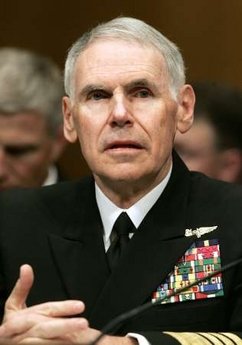

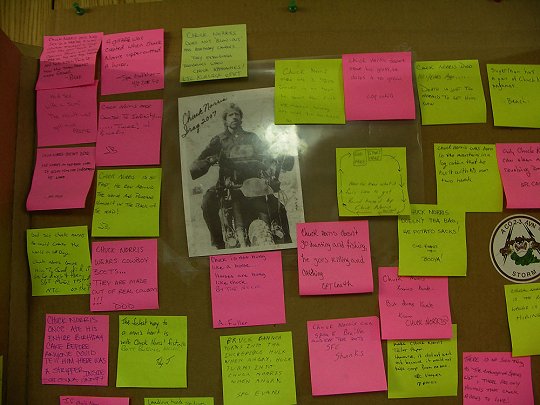

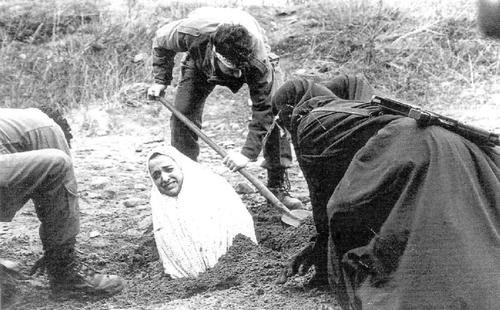



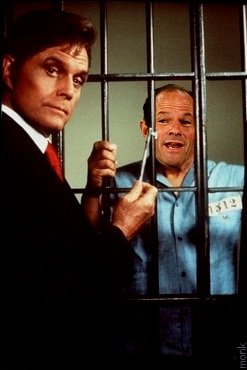







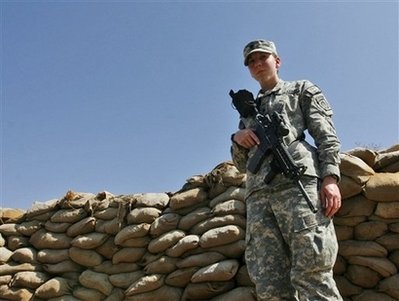
 ….. Thank you Tom for sending this to me.
….. Thank you Tom for sending this to me.
Recent Comments